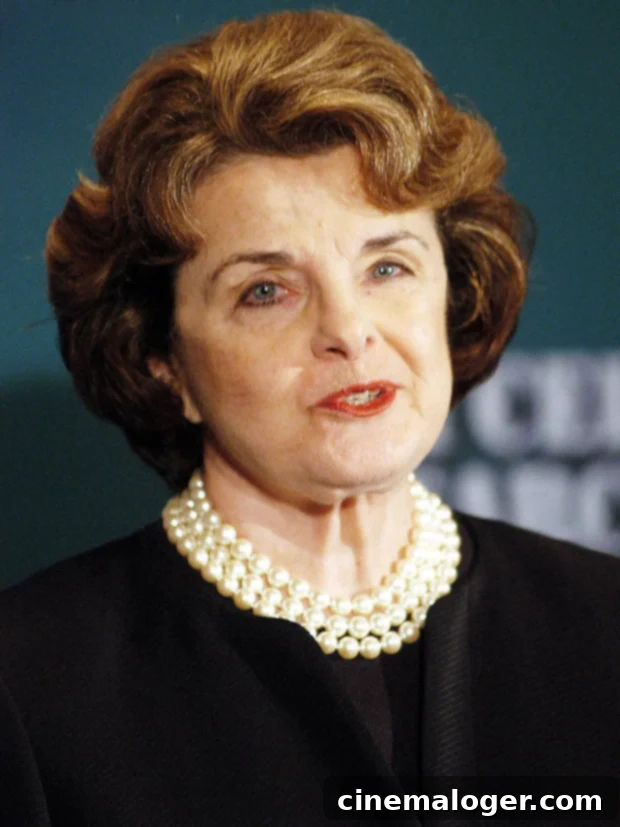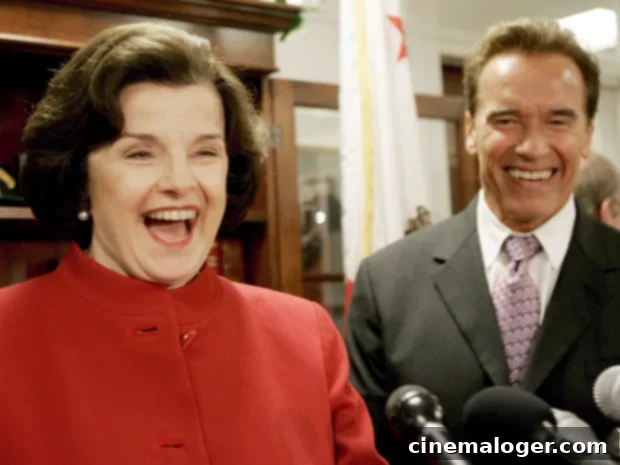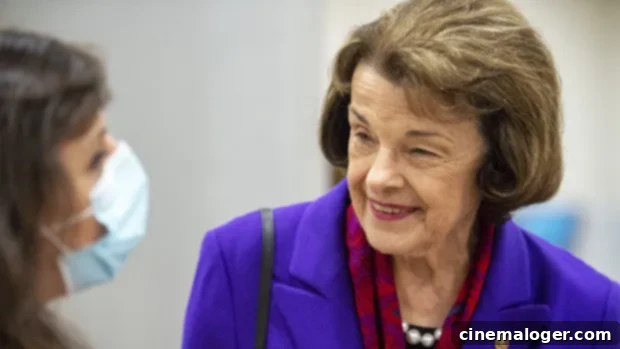Dianne Feinstein: Honoring the Enduring Legacy of a Pioneering California Senator and San Francisco Mayor
Senator Dianne Feinstein, a political titan whose career spanned over five decades, passed away at the age of 90 on Thursday, September 28, 2023. The news of her death, confirmed by a family member to The New York Times, sent ripples across the nation. Her staff was reportedly informed of her passing at 9 a.m. PST. As the longest-serving female senator in U.S. history, Feinstein’s indelible mark on California and American politics is profound, characterized by a steadfast commitment to public service and groundbreaking legislative achievements. Her career was a testament to resilience, breaking barriers, and shaping crucial policies from the local level in San Francisco to the highest chambers of Washington D.C. She was not just a politician but a pioneering figure who carved a path for women in governance, demonstrating unwavering dedication throughout her extraordinary life.
Feinstein’s passing came just over a month after a minor fall at her San Francisco home. Although she was briefly hospitalized as a precautionary measure, her office released a statement, reported by The Associated Press, confirming that she had been cleared to return home after scans showed no serious injuries. This incident, however, highlighted the ongoing public discourse surrounding her health in her later years, a conversation that often overshadowed her immense contributions. Despite these challenges, Feinstein continued to serve, illustrating her deep-seated dedication to her constituents until her final days. Her journey was one of continuous public engagement, marked by pivotal moments that defined an era of California and national politics. She navigated complex issues with a blend of pragmatism and conviction, earning respect from across the political spectrum, even from those who disagreed with her positions.

A Life of Public Service: From San Francisco to the Senate
Born Dianne Emiel Goldman in San Francisco in June 1933, Feinstein’s roots in the Golden State ran deep, and she dedicated the vast majority of her life to serving its people. Her distinguished political career commenced in 1969 when she was elected to the San Francisco County Board of Supervisors, a position she held for nine impactful years. During her tenure on the board, she developed a reputation as a diligent and effective legislator, tackling local issues with a focus on urban planning, environmental protection, and public safety. This early experience laid the groundwork for her future leadership roles, honing her skills in navigating complex municipal challenges and forging consensus among diverse interests. Her rise through San Francisco’s political ranks was steady, demonstrating her natural aptitude for leadership and her deep understanding of community needs.
Mayor of San Francisco: Navigating Crisis and Leading Innovation
The trajectory of her career took an unforeseen and dramatic turn in November 1978. Following the tragic assassinations of Mayor George Moscone and Supervisor Harvey Milk, Dianne Feinstein, then president of the Board of Supervisors, was thrust into the mayor’s office. This sudden and harrowing transition marked a pivotal moment, not only for Feinstein but for San Francisco. She bravely stepped into the breach, providing crucial leadership and stability during a period of profound grief and political turmoil. Her immediate task was to heal a fractured city, restore public confidence, and maintain essential city services, all while navigating intense media scrutiny and the emotional weight of the crisis. Her composure and strength during this trying time solidified her reputation as a resilient and capable leader.
Feinstein served two full four-year terms as Mayor, from 1978 to 1988, a period during which she presided over the city’s recovery and subsequent economic growth. Her mayoral accomplishments were extensive, including efforts to revitalize downtown San Francisco, secure funding for public transportation, and champion environmental initiatives such as recycling programs. She was also instrumental in addressing the burgeoning AIDS crisis, allocating significant resources for research, prevention, and patient care, making San Francisco a model for compassionate public health responses. Her tenure as mayor was characterized by a pragmatic approach to governance, combining fiscal responsibility with social progress. She skillfully managed a diverse and often politically volatile city, demonstrating an ability to unite different factions for the greater good of San Francisco residents. Her leadership during the 1980s solidified her status as a formidable force in California politics.
Ascension to the U.S. Senate: A New Chapter
Following her successful tenure as mayor, Feinstein set her sights on statewide office, making a bid for Governor of California in 1990. Though she narrowly lost to Republican Senator Pete Wilson, her statewide campaign introduced her to a broader electorate and showcased her policy expertise. Just two years later, a unique opportunity arose. When Pete Wilson vacated his Senate seat to become Governor, Feinstein seized the moment, running in the special election to fill the vacant position. She emerged victorious in 1992, making history alongside Barbara Boxer as one of the first two female senators from California. This election, dubbed the “Year of the Woman,” marked a significant shift in American politics, with Feinstein at the forefront of this groundbreaking movement. She was subsequently re-elected five more times – in 1994, 2000, 2006, 2012, and 2018 – establishing an enduring presence in the Senate. Her commitment to her constituents remained unwavering, and she had already announced her decision not to seek re-election in 2024, signaling an intended retirement after decades of tireless service.
Legislative Prowess and Enduring Impact
During her lengthy and distinguished tenure in the U.S. Senate, Dianne Feinstein served on a wide variety of influential committees and subcommittees, allowing her to shape legislation across numerous critical areas. Her significant committee assignments included the powerful Committee on Appropriations, which oversees federal spending; the Committee on the Judiciary, where she played a key role in debates over judicial nominations and legal policy; the Committee on Rules and Administration, which manages the daily operations of the Senate; and, notably, the Select Committee on Intelligence, where she eventually served as chair, overseeing the nation’s intelligence agencies. Her legislative portfolio was vast and impactful, reflecting her broad policy interests and her dedication to improving the lives of Americans.
Key Accomplishments and Policy Initiatives
Among her many accomplishments, Feinstein was a driving force behind the reauthorization of the Violence Against Women Act (VAWA), a landmark piece of legislation designed to combat domestic violence, sexual assault, and stalking. Her tireless advocacy ensured continued funding and protections for victims, solidifying her reputation as a champion for women’s safety and rights. She was also a prominent voice in efforts to pass legislation aimed at combating climate change, advocating for renewable energy and environmental conservation, aligning with California’s progressive stance on ecological issues. Furthermore, her oversight work on the Select Committee on Intelligence led to a comprehensive review of the CIA’s use of enhanced interrogation techniques, resulting in a seminal report that brought greater transparency to controversial national security practices. This courageous stance on accountability underscored her commitment to civil liberties and ethical governance. Her Senate bio highlights these and countless other legislative victories, underscoring her effectiveness as a lawmaker and her profound impact on public policy. She championed numerous initiatives focused on gun control, environmental protection, and safeguarding California’s natural resources, always returning to her deep commitment to the state she represented.
Breaking Barriers: A Voice for Women in Politics
As the longest-serving female senator in U.S. history, Dianne Feinstein was not only a trailblazer but also a vocal advocate against sexism in politics. She frequently called attention to the systemic biases and patronizing attitudes faced by women in power, bravely sharing her experiences and observations. In a powerful statement, documented by Contact Senators, she articulated this struggle with piercing clarity: “Let the record show that you can be a United States senator for 21 years. You can be 79 years old. You can be the chair of the Senate Select Committee on Intelligence, and one of the most recognizable and widely-respected veteran public servants in your nation. But if you are female while all of those things, men who you defeat in arguments will still respond to you by calling you hysterical and telling you to calm down. They’ll patronize you and say they admire your passion, ‘sweetie,’ but they deal in facts, not your silly, girly feelings. It’s inescapable. You can set your watch by it.” This quote encapsulates the frustrations and prejudices she, and many other female politicians, endured. Her candidness served as an inspiration for generations of women aspiring to leadership roles, encouraging them to persevere against gender-based obstacles and to demand equal respect and recognition for their intellect and contributions. She became a symbol of resilience and a testament to the power of women in shaping policy and public discourse.

Later Years, Health Challenges, and Reflecting on a Career
In March 2023, Senator Feinstein took an extended leave from the Senate after being diagnosed with shingles, a significant health challenge that drew considerable public attention. Her absence, prolonged due to complications, regrettably led to notable slowdowns in Senate proceedings, particularly creating difficulties for Democrats attempting to pass crucial legislation, especially through key committees where her vote was essential. This situation ignited a wave of public debate and, for many, prompted calls for her resignation, as documented by FiveThirtyEight. The discussions centered not only on her immediate health but also on the broader implications of age and health for public service in the Senate. Upon her return in May, questions persisted regarding her capacity to fully perform her duties, given her advanced age and recent health struggles, a topic frequently covered by outlets like The New York Times. Despite these intensely scrutinized challenges, Feinstein demonstrated characteristic resilience, returning to Washington to continue her work, underscoring her deep-seated commitment to her role and her constituents. Her dedication to serving, even amidst personal health battles and public pressure, defined her unwavering resolve and illustrated her belief in the importance of her presence in the legislative process.
A Personal Touch: Family and Resilience
Throughout her demanding public life, Dianne Feinstein experienced significant personal moments, including three marriages. Her final and longest marriage was to investment banker Richard C. Blum, whom she wed in 1980. Their union lasted over four decades until his passing in 2022. Feinstein is survived by her daughter, Katherine Feinstein, whom she had with her first husband, Jack Berman. Katherine has followed a path of public service herself, establishing a distinguished career as an attorney and former judge. She currently serves as the President of the San Francisco Fire Commission, continuing her family’s legacy of dedication to the city of San Francisco. Dianne Feinstein’s personal life, marked by both love and loss, provided a foundational strength that undoubtedly supported her extraordinary career. Her ability to navigate both intense public scrutiny and personal challenges while maintaining her commitment to public office speaks volumes about her character and resilience.
Dianne Feinstein’s Lasting Legacy
The passing of Dianne Feinstein marks the end of an era in American politics. Her legacy is one of groundbreaking achievements, particularly for women in leadership, and a steadfast dedication to the principles of justice, environmental protection, and public safety. From her pivotal role in stabilizing San Francisco after a period of profound tragedy, to her decades of legislative impact in the U.S. Senate, Feinstein consistently demonstrated a fierce intelligence, a pragmatic approach, and an unwavering commitment to her constituents. She championed causes ranging from gun control and women’s rights to intelligence reform and environmental conservation, leaving an indelible mark on numerous policy areas. Her voice, often characterized by its calm authority and thoughtful deliberation, was a powerful force in Washington. Dianne Feinstein will be remembered not only for the length of her service but for the depth of her impact, paving the way for future generations of leaders and embodying the spirit of dedication to public welfare. Her life story is a testament to the power of perseverance, the importance of breaking barriers, and the profound difference one individual can make in shaping the course of a nation.
